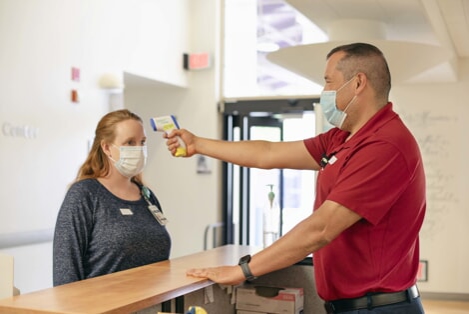
Adventist Health Ukiah Valley resumes elective surgeries and outpatient services
As social distancing and other precautions by the community have helped to flatten the COVID-19 curve, state as well as local public health authorities are allowing many healthcare services to resume, including elective surgeries and procedures.
Adventist Health Ukiah Valley has resumed services that were put on hold while continuing its focus on keeping patients and staff safe, as pandemic challenges remain.
“Our preparations for the pandemic began even before we saw our first COVID-19 patient. We have carefully followed Center for Disease Control and state guidelines to do all we can to flatten the curve on this crisis. Early on, the goal was to minimize additional traffic and focus our resources on preparing for the pandemic to keep our community, staff and patients safe by stopping the spread,” explains Jason Wells, president for Adventist Health in Mendocino County. “The community has done a great job of sheltering in place and our teams on the front lines are grateful for that. We continue to be vigilant and monitor our resources. With the higher acuity we are seeing across our clinics and hospital, it is clear we as a community need to collectively put our personal health back in focus. We are eager to reconnect with many of our patients and continue our mission of caring for our community. We stand ready to provide care in a very safe environment.”
Surgeries such as knee replacements and other procedures are now being performed, as well as outpatient care, including laboratory services, medical imaging procedures such as mammograms, as well as rehabilitation services such as physical therapy and more.
As services gradually resume, patient safety continues to be the highest priority, Wells explains. Adventist Health Ukiah Valley has instituted policies and procedures aligned with state and national guidelines to protect patients and their loved ones during the COVID-19 pandemic. Appointments may look a little different as safety precautions are in place, including enhanced cleaning and disinfection, screening patients and staff prior to entry, limiting visitors, requiring everyone to wear a face mask, practicing social distancing and reconfiguring waiting areas to allow for social distancing.
Since resuming surgeries and other procedures three weeks ago, the hospital has already performed almost 200 procedures. Nicole Woodruff, surgery department director, says hospital staff has been reaching out to patients, rescheduling surgeries and procedures and talking through any concerns. “We understand our community members’ concerns, and we want to assure them that it is safe to get care.”
As part of safety precautions, patients going in for surgeries are required to self-monitor for coronavirus symptoms and are screened for symptoms prior to their procedure.
“The measures create a bit more work for the patients and for us, but they’re necessary steps to keep them safe given we still have a pandemic,” Woodruff says.
As hospital staff welcomes back patients, they’re still seeing a concerning decline in the number of patients with certain conditions such as heart attacks and strokes. “Since the onset of the coronavirus in our communities, some of our patients have delayed seeking care out of an abundance of caution,” shares Bessant Parker, MD, medical officer for Adventist Health in Mendocino County. “Putting off needed care is not good for our patients – – especially acute symptoms such as chest pain or abdominal pain and other conditions such as heart attacks and strokes, where timely response is everything.”
A recent survey by the American College of Emergency Physicians found that 29% of adults have avoided medical care because they are concerned about contracting the virus. Hospitals nationwide, including Adventist Health, have seen a 38% decline in the number of patients presenting with heart attacks. The decline is extremely concerning to physicians, especially for patients with heart disease and cancer, who require early screening, constant surveillance and treatment. “The exceptional team in our Emergency Department is ready to care for our community in a safe, sterile and state of the art environment. Strokes, heart attacks and other serious conditions do not stop during a pandemic; and warning signs should not be ignored. Chest pain, abdominal pain, acute leg swelling, strokes, heart attacks and other serious conditions do not stop during a pandemic and warning signs should not be ignored. Anyone experiencing such acute persistent or worsening symptoms of any kind that they are concerned about should go to the nearest emergency department or call 911,” Dr. Parker adds.
Adventist Health Ukiah Valley’s primary care and specialty care providers are also open and seeing patients for scheduled virtual visits and in-office visits. Virtual visits, which have grown exponentially, will continue to be an important part of patient care when appropriate to minimize the need for in-person visits. For in-person visits, the same screening protocols are implemented. Patients and staff wear face masks, and social distancing is observed in all settings. Appointments may be scheduled by calling 1-833-AH-WELLNESS (1-833-249-3556).


